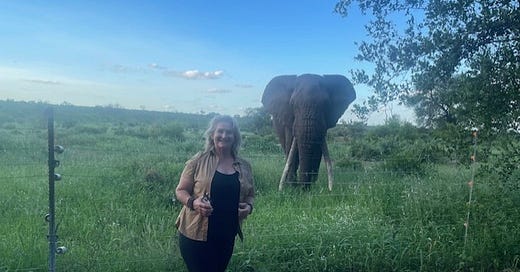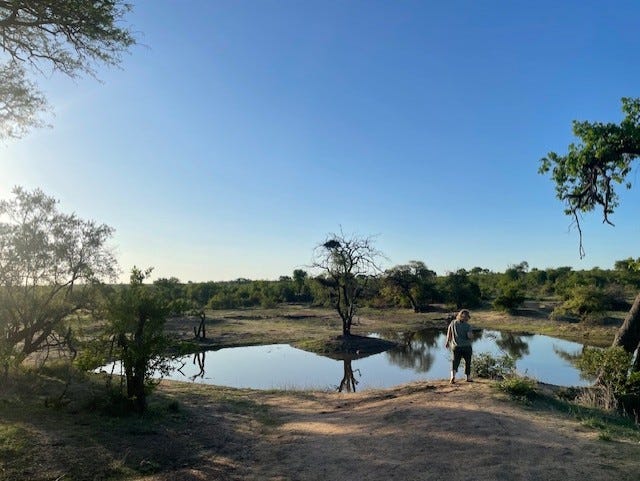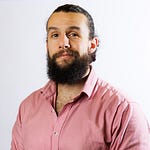My friend Sharon Hausmann, committed mother, wife, and daughter, and CEO of the Greater Kruger Environmental Protection Foundation (GKEPF), has passed away.
She was too much of a force of nature for her to pass quietly from this world. Here is a taste of the people she was able to pull together and the impact they could have on the world.
I am going to say a few words and read out a statement put out by GKEPF and a piece I wrote for Sharon while I worked with her in South Africa. You can find this piece below.
Uniting communities and conservation through sport: GKEPF and The James Mayinga Foundation Under 19s Soccer and Netball Tournament 2024.
In the rural backstreets of Bushbuckridge, on the western boundary of the Greater Kruger protected areas, young men and women come together after hours and on weekends to play soccer and netball. The soccer games are played on dusty, uneven fields. Usually, the players do not have kits or proper footwear and often play with the same tired old ball. The young women, many who are underage, are often invited to play netball at taverns where they compete for prize money and attract the patronage of men who drink there. Fast forward to December 2024, and these same players are walking out onto the pitch and courts at the Thulamahashe New Stadium in full kit in front of hundreds of people to play in a tournament that is to be streamed live on SuperSport for the whole country to see.
In the early months of 2023, the Greater Kruger Environmental Protection Foundation (GKEPF), with the support of WWF Khetha and the United States Agency for International Development (USAID), and in partnership with local soccer associations and GKEPF’s member reserves, implemented a sports programme in Welverdiend to provide financial support, kit, coaching clinics, and scouting opportunities to the community’s soccer players. The aim was to encourage social cohesion and positive relationships through sport as a way of guiding young people toward developing productive skills and away from crime – including wildlife crime – so the region can be safer for people and animals. GKEPF was established in 2016 to coordinate the environmental protection efforts, communications, and resources of several private reserves in the Greater Kruger open system. This was a direct response to the rhino poaching crisis which peaked in 2017 with 69 losses on these private reserves in a single year. During this crisis and over the years approaches to conservation have developed to include broader community-based efforts.
For the several million people living on the edge of the reserves, their situation can be desperate. There are vast disparities in outcomes, high rates of unemployment (65% for 18-25s), many struggle with substance addiction and debt, and access to running water, electricity, and waste disposal is sporadic at best. These conditions drive some toward crime where people and animals become victims. It is the position of GKEPF that facing up to and tackling the drivers of crime, which destroy both human and animal lives, is the surest path toward a healthy region where people and animals can live in greater harmony.
Importantly, recent polling suggests that as much as people may be dealing with relative privation, many feel they are able to live the lives they want to lead and have a deep appreciation of their natural heritage. 2112 people were surveyed along the western boundaries of the reserves from the south to the north. The vast majority valued the protected areas and considered poaching to be a serious problem. When asked why people might turn to poaching, many linked it to the desperate economic situations.
However, attitudes could change toward efforts to protect the natural environment, especially if people feel conservation is being done at the expense or in neglect of the people who also share the same landscape. “The rhino has its own doctor, its own policemen, its own helicopter, its own land and there are rangers that protect it. We don’t have these things. If the rhino goes extinct tomorrow, maybe we can finally get these things.” This was taken from a 2018 publication from the Global Initiative Against Transnational Organised Crime (GITOC), Ending Wildlife Trafficking: Local Communities as Change Agents, which engaged with community interests.
Meanwhile, The James Mayinga Foundation (JMF), started in 2017 by James Mayinga, a local of Thulamahashe in the Bushbuckridge municipality and former professional soccer player, has been running a soccer tournament annually since 2021. The foundation aims to give back to his community some of the opportunities James was able benefit from during his career.
In the early months of 2024, James, along with professional coaches and scouts, attended soccer clinic GKEPF had organised as part of its sports programme. The collaborative value was clear, and a partnership was formed between GKEPF and the James Mayinga Foundation to unite communities and conservation through sport. Kruger National Park joined as a title partner later in the year, and together they made history by putting on the biggest tournament Thulamahashe had ever seen.
From the 14th – 22nd December, 40 teams consisting of men’s soccer, ladies’ soccer, and netball, (amounting to approximately 750 young people) entered the stadium to battle it out and show off their skills. It was the first time many had ever played in a full kit. At the same time, they had the opportunity to play live on television via SuperSport and in front of hundreds of people, including talent scouts – three young athletes were offered the opportunity to attend trials at professional clubs, and one has been selected to join Sekhukhune United F.C., a Premier Soccer League team.
Positive role models like James giving back to their communities having gained success also show a way of acting in the world: hard work, compassion for man and animals, and dedication to his family and community. If others aspired to emulate James, sharing in their success and demonstrating a positive way of living, then the positive effects will continue to ripple out into the wider community.
The effort that went into putting on such an event was enormous: Arranging access to the stadium, services like water and waste disposal; organising timely transport for teams; designing and printing the kit; hiring security and staff to be on site for the week; interviewing and advertising; the scheduling; preparing food for the players and the staff; cleaning the stands after each day; ensuring the SuperSport staff were able to record and livestream the games, the list goes on. So many passionate people came together to make this event a success that provided so much meaning to the fans and the players. When I asked one player from the winning ladies’ team how it felt to win, she told me, “It feels so great, it’s a big achievement for me and my team and for the community.”
Everyday people would filter in to support their team and to socialise with cooler boxes full of beers, ciders, and soft drinks. There was a tuck shop where people could buy chips and popcorn. People set up grill areas to cook meat to sell, and there were men and women selling boiled eggs and peanuts. For ten days there was economic opportunity for people, a concentration of potential customers. Despite the presence of alcohol, I saw only one man be asked to leave for drunkenness. Everyone else enjoyed themselves responsibly, the atmosphere was lively and there were smiles everywhere you looked.
The players were incredible to watch. The celebrations, elated faces when the final whistle blew, defeated yet stoic expressions and sometime tears, these games meant something to these people; and the sportsmanship on display warmed the heart. I saw the winning netball team and runners up battle it out fiercely and then celebrate with each other almost immediately after the game was over, only briefly separating to their coaching areas before coming together on the court to dance and laugh as one. I then saw a soccer player miss a penalty in the semi-final shootout, eliminating his team from the tournament. He collapsed to the floor and as the winning team ran to celebrate, some stopped to pat the player on his back, consoling him for his miss. This player had to be picked up and comforted off the pitch by his coach, before joining his teammates in the changing room to prepare themselves for the game to determine third place – a game they went on to win.
These tournaments are a site of enormous potential that requires the attention and efforts of many people to pull off. Most of the funding and organisation of these events comes from, and in the short term is likely to continue coming from, external sources from organisations like GKEPF and their members reserves, Kruger National Park, the James Mayinga Foundation, and other potential donors. The ideal scenario, however, is that these events will increasingly be taken on by the people of these communities allowing them to make these tournaments their own.
Achieving this would create a self-sustaining environment where players, coaches, organisers, and chairpersons can develop transferable skills and virtues: patience to work as a team, honesty and integrity, learning from failure, discipline and dedication, charity. These are all skills that healthy and productive communities around the world are built on – skills and virtues that guide people away from corrupting behaviour. These tournaments also provide opportunities for venders, increasing the money that flows through these parts, and encourage entrepreneurial youngsters to spot niches that they could fill with a product or service … the possibilities are endless.
For now, the GKEPF Sports Programme and the tournament held in December has established the foundation for an enduring working relationship between the communities and protected areas in the Greater Kruger. From this a sense of shared ownership over the socio-economic and environmental challenges that lay ahead can, and hopefully will, continue to develop.
For Sharon













Share this post